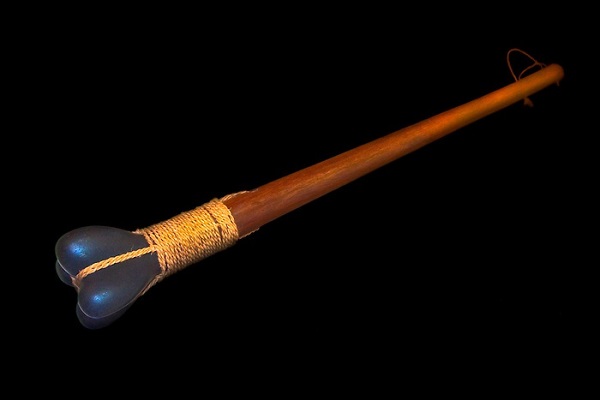I have tried doing a search online, but am having some trouble finding a good source that compares different types of clubs from all over the world.
Specifically, I am wondering if the Maori short greenstone club was a good weapon. Obviously very close quarter combat, but how was it overall?
Also, can anyone find any examples of oar clubs? They are basically clubs shaped liked the oar for a canoe, long flat-heads. I swear I have seen these somewhere before, but upon searching for them now, I cannot find a single one. Are these practical as weapons? Hitting with the flat side does not seem like a good idea as the energy would be too spread out over too much area. But what about striking with the unsharpened edge?
| Nicholas Penner wrote: |
|
Specifically, I am wondering if the Maori short greenstone club was a good weapon. Obviously very close quarter combat, but how was it overall? |
I had some exposure to these in NZ, in my estimation the mere and other patu are excellent and versatile hand weapons. They can thrust of course, strike with either edge or the "pommel," for a less lethal option they can slap with the flat and even be hurled to strike an enemy at a distance. Because of their compact size they're convenient to carry and having something to pound on stuff with is quite nearly as useful as having a blade for utility purposes. Unlike a blade a patu can dangle by the wrist thong while you wield some other weapon or perform another task with no worries about accidentally cutting yourself yet it's immediately accessible if needed. Given that the Steyr and LMT aren't well set up for bayonet fighting if I were the NZDF I'd push for some kind of modernized patu made of high performance polymers as a supplementary hand-to-hand weapon and less lethal option kind of like how some in the US are taking to the tomahawk or the Nepalese and their khukuri.
| Nicholas Penner wrote: |
| Also, can anyone find any examples of oar clubs? They are basically clubs shaped liked the oar for a canoe, long flat-heads. I swear I have seen these somewhere before, but upon searching for them now, I cannot find a single one. Are these practical as weapons? Hitting with the flat side does not seem like a good idea as the energy would be too spread out over too much area. But what about striking with the unsharpened edge? |
You could also search for "paddle club". There are two main kinds of oar clubs: the ones with heads with straight sides (like oars), and the ones with rounded sides (like canoe paddles). There are also clubs with long flat heads that don't resemble oars as much; these are typically called sword-clubs.
You use the thin edge for striking. Compared to round-section clubs, flat-section clubs (paddle clubs & sword clubs, etc.) will, I expect, do more damage when hitting soft parts of a target (due to the smaller striking surface) if of the same length and weight. More work to make, and you need to start with a larger piece of wood.
There is also the eku, the oar in Okinawan kobudo: https://en.wikipedia.org/wiki/Eku , which is AFAIK a quite heavy club, and might be a training tool rather than a weapon (like the suburito, which is a heavy bokken). The traditional "primitive" oar clubs are lighter (and thinner).
Not all thin edges clubs are ora/paddle/sword clubs. Polynesian gunstock clubs are edged, there are various diamond-section clubs that aren't sword or oar/paddle-shaped, and triangular section clubs (now used as the local cricket bat in Fiji, iirc). The idea of a thin striking edge is taken to a greater extreme in bird-head clubs and pick-clubs.
You might enjoy browsing the British Museum clubs: http://www.britishmuseum.org/research/collect...mages=true
(alas, weights aren't given for many specimens).
My favorite Polynesian club is the pōhaku newa. They were made with a hardwood handle like milo and had a basalt head bound with coconut cord. Some are very short one-handed weapons, others (like the one shown below) are 2-3 feet long. It's really more of a mace than a club.
Given that the Lua warrior's armor was nothing more than woven fiber mats or "helmets," these weapons would have been devastating.
A couple are on display at Pu'ukohola Heiau National Historic Site on the Kohala Coast of the Big Island.
Beautiful ain' it?
 Attachment: 30.17 KB
Attachment: 30.17 KB

Given that the Lua warrior's armor was nothing more than woven fiber mats or "helmets," these weapons would have been devastating.
A couple are on display at Pu'ukohola Heiau National Historic Site on the Kohala Coast of the Big Island.
Beautiful ain' it?

| William P wrote: |
| mr skallagrim shows a few examples in his video
https://www.youtube.com/watch?v=2C6_pSEPbO8 |
Yes a very good video.
One can also add the staff like weapons on various lengths like the Quarterstaff in Europe and the Bo and Jo staffs in Japan and similar ones in China maybe just with a different name.
The there is " Jogo DO Pau " : https://en.wikipedia.org/wiki/Jogo_do_pau
Page 1 of 1
You cannot post new topics in this forumYou cannot reply to topics in this forum
You cannot edit your posts in this forum
You cannot delete your posts in this forum
You cannot vote in polls in this forum
You cannot attach files in this forum
You can download files in this forum
All contents © Copyright 2003-2006 myArmoury.com — All rights reserved
Discussion forums powered by phpBB © The phpBB Group
Switch to the Full-featured Version of the forum
Discussion forums powered by phpBB © The phpBB Group
Switch to the Full-featured Version of the forum